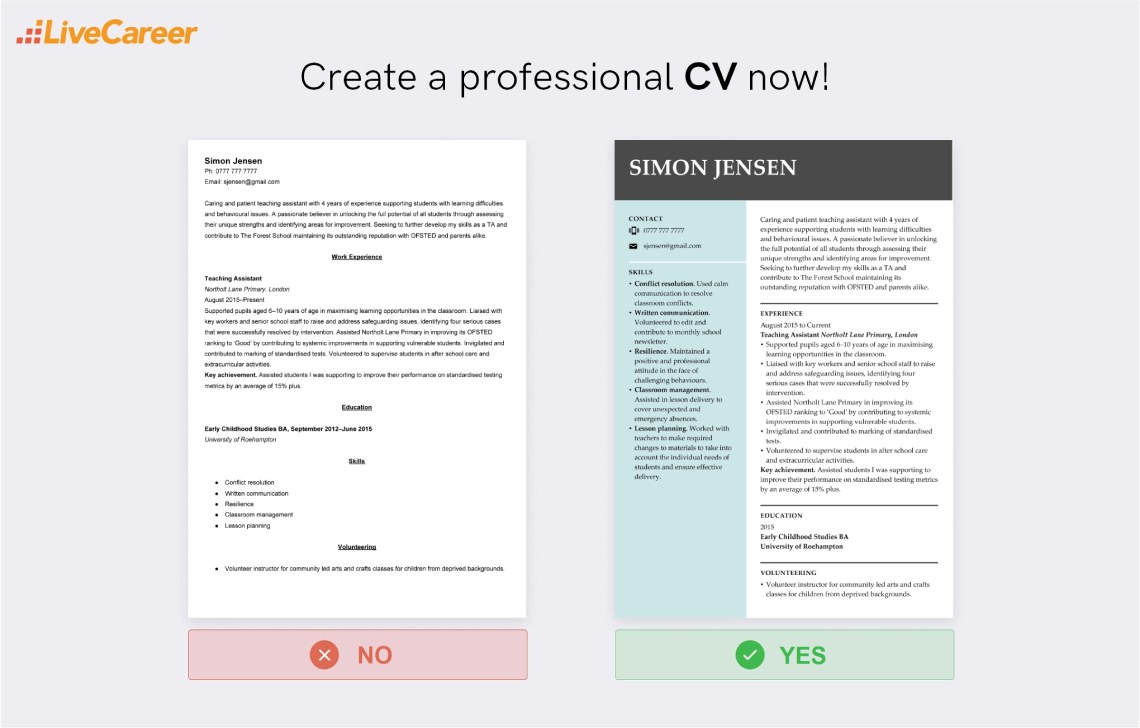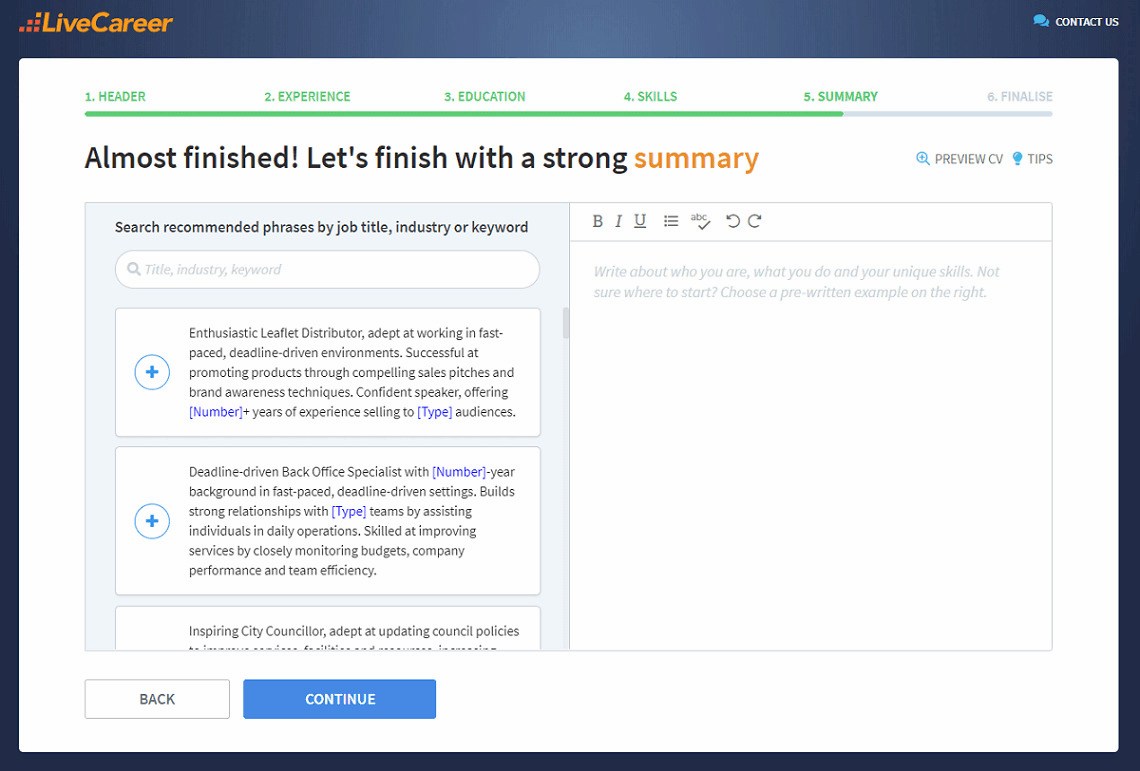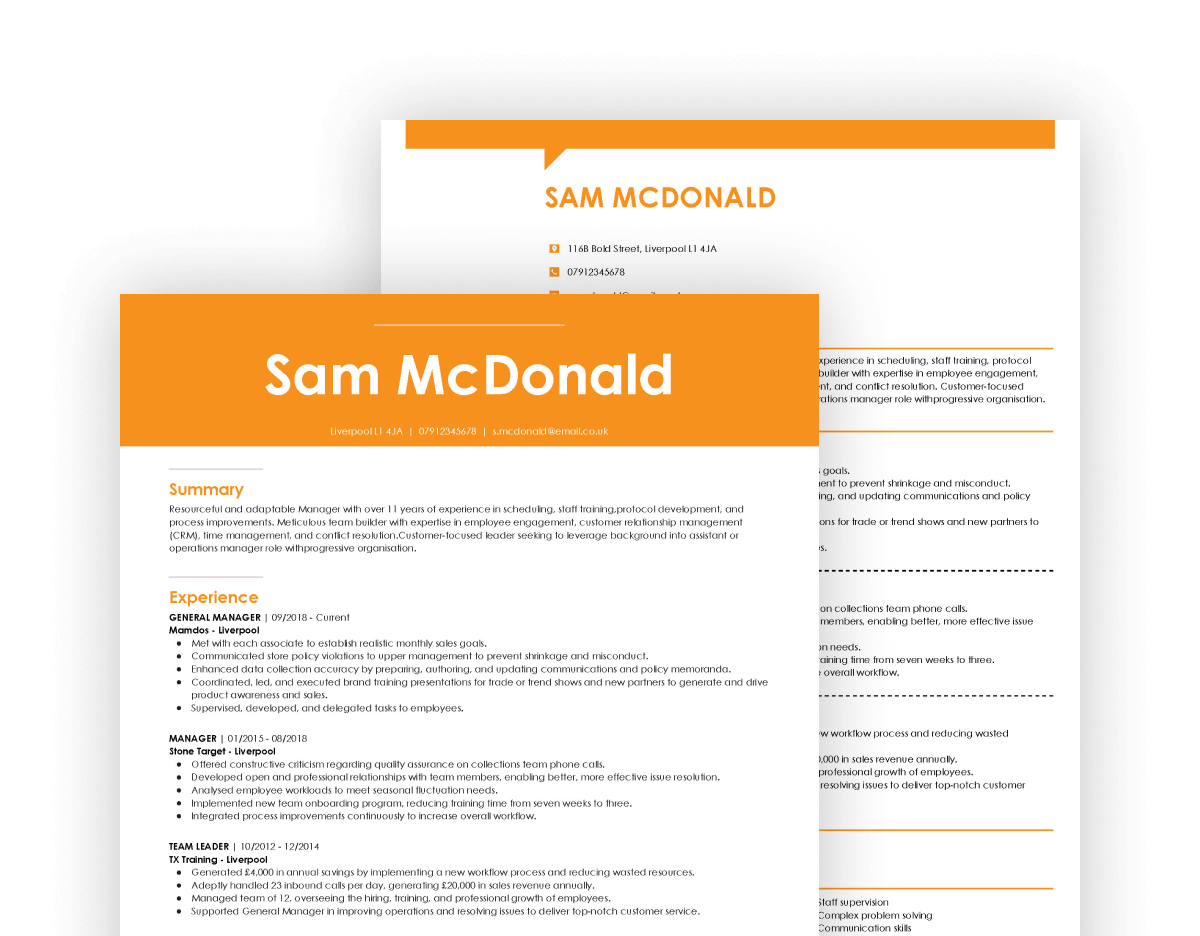Customer Service CV Example & Guide for 2025
See great customer service CV examples that’ll help you whether you need to write a CV for customer service assistant jobs or a customer service manager CV.
Our customers were hired by:
The number of applicants for each role is increasing. Competition is fierce. The only way you have of standing out from that massive pile of applications on the recruiter’s desk is to craft a perfectly written CV. And we’re here to help you do just that.
This collection of CV tips and advice covers everything you need to get the edge in a competitive job market. You’ll get easy to action CV writing tips, advice on layout and CV formatting tips. In short, everything you need for job-seeking success.
Create an effective CV in minutes. Choose a professional CV template and fill in every section of your CV in a flash using ready-made content and expert tips.

We created the sample on the right using our builder. See other good CV examples like this one.
Looking for more specific CV tips and guidelines? Check:
Simon Jensen
Ph: 0777 777 7777
Email: sjensen@gmail.com
Caring and patient teaching assistant with 4 years of experience supporting students with learning difficulties and behavioural issues. A passionate believer in unlocking the full potential of all students through assessing their unique strengths and identifying areas for improvement. Seeking to further develop my skills as a TA and contribute to The Forest School maintaining its outstanding reputation with OFSTED and parents alike.
Work Experience
Teaching Assistant
Northolt Lane Primary, London
August 2015–Present
Key achievement. Assisted students I was supporting to improve their performance on standardised testing metrics by an average of 15% plus.
Education
Early Childhood Studies BA, September 2012–June 2015
University of Roehampton
Skills
Volunteering
There’s a lot of CV advice out there, but if you follow these simple tips you can be sure of a professional result.
We’ve chosen this as number 1 in our top CV tips for a reason. It’s simply the single most important piece of CV writing advice we can give you. The trick is to treat every job application as unique. Never just copy and paste the same old text.
That’s because in the job-hunting game, quality counts over quantity. It’s better to take the time to submit one perfectly tailored CV than rush through three quick copy-paste jobs. It’s easy to do too. All you need is to do is ensure your CV is properly targetted to the job you’re applying for.
And there’s even a ‘cheat sheet’ to help you do it. It’s called the job advert. Read it carefully, note all of the experience and skills that it mentions and then make sure you highlight your own experience and abilities that match the requirements. Think of it as the hiring manager’s wish list for the perfect candidate, it really is your ultimate guide to writing your CV.
One of the most important CV writing tips is to make sure you choose the best format, and when it comes to CVs there’s only one game in town. It’s called chronological format and it’s the tried and true classic that recruiters have come to expect. It showcases your employability in an easy-to-follow structure and places the emphasis exactly where it should be, on your professional experience. And the order of CV sections should be as follows.
The second type of CV format used in the UK is known as a functional or skills-based CV. It focuses on transferable skills rather than work history and it’s really only suitable for a limited number of candidates. If you’re writing a career change CV, a military transitioner or a gig-based worker, then it can be useful. But they’re notoriously difficult to write well and aren’t popular with recruiters. But if you do opt for a skills-based CV the order of sections should be as follows.
It’s important to follow our tips for writing a good CV but make sure you create a CV that looks good too. Use these CV tips and tricks for a professional layout that’s attractive and easy to read.
Bonus tip for CV writing
In most cases the best CV length is 1–2 pages. Our CV advice is to aim for one page if you’re writing a graduate CV, student CV or school leaver CV. You can go for two pages if you’ve got more than a couple of years of work history. And if you’ve got more than 10 years of experience and you’re targetting senior posts in technically demanding careers you can even stretch to three. Specialised formats such as an academic CV or medical CV can be even longer. But for most people 1–2 is ideal.
It’s an often overlooked piece of CV advice, but what you leave out is just as important as what you include. First of all, leave out your postal address. It’s completely unnecessary in a time when job applications are submitted online and it just takes up valuable page space that could be dedicated to skills or experience.
Also leave out sensitive personal details such as your marital status or date of birth. They have no bearing on your ability to do the job and can cause all sorts of issues when it comes to discrimination. The same goes for including a photograph. Whilst it might be commonplace in parts of mainland Europe, it’s not considered acceptable in the UK.
Bonus tips for a good CV
Now we’ll look at some tips for writing a CV, section by section. Your CV header is the very first section of your CV that contains your personal details. Start with your name and make it stand out, it’s a key piece of information that distinguishes you as an individual, so write it in a font size 4–8 pts larger than your body text. Then make sure you include your basic contact details, phone number, email address, LinkedIn profile and social media profiles if applicable.
Bonus CV tips and tricks
Your CV summary or personal profile is the introduction to your CV. It should be 3–5 lines long and convince the hiring manager to keep reading the rest of your CV. In terms of CV personal statement tips, all you need to do is answer three questions.
So start off by mentioning your job title and how much experience you have. Then highlight some skills and/or experience that prove you’ll make a solid contribution, and finish by stating how you plan to grow in the role and contribute to the employer’s success.
It’s without a doubt the most important section of your CV and the part that recruiters will pay most attention to. Write it in reverse-chronological order, starting with your most recent role first. Then include the same basic information about each entry, your job title, the name of the company and your dates of employment. Finally, use the following CV writing advice to make your work experience section perfect.
Bonus CV tip
Key achievement. Assisted students I was supporting to improve their performance on standardised testing metrics by an average of 15% plus.
It can feel like an afterthought, but your education section is an essential addition to every CV. Follow this CV advice to get it right.
If you’re a university graduate, list the name of your degree, the name of your university and your dates of study. Include an expected graduation date as the end date if you’re still a student.
For school leavers, include your A-levels, listing the subjects you completed, the name of your school or college and your dates of study. GCSEs aren’t essential, unless you’re still at school or you’ve just left. And if you do decide to include GCSEs you don’t need to mention every subject. Just state the number of subjects you studied and only mention maths and English specifically, as some employers do treat these as a bare minimum entry requirement.
And a couple more tips for a good CV if you’re still studying or have just graduated.
A strong CV summary will convince the recruiter you’re the perfect candidate. Save time and choose a ready-made personal statement written by career experts and adjust it to your needs in the LiveCareer CV builder.

Specific skills and abilities are just as important as experience. Make sure your skills section best shows off your potential as a prospective employee. Make it targetted by noting all of the skills mentioned in the job advert, listing your own skills, and making sure you match your own skill set to the job description as closely as possible.
Then choose 5–10 skills to include on your CV. Make sure it’s a mix of soft skills and hard skills, and include a short sentence that describes how you demonstrate it. For example.
Resilience. Maintained a positive and professional attitude in the face of challenging behaviours.
And remember that some skills are useful for almost every job. Communication skills and IT skills for example look great on any CV.
To beat the competition you need to add something extra, show some additional abilities or achievements that help you to stand out as a candidate. One of the easiest ways to do that is to include additional sections in your CV.
Good examples are hobbies and interests, foreign languages, awards, projects and certificates. If it’s relevant and helps to strengthen your position as a top candidate then it’s worth including.
Unless the job application says otherwise, save your CV as a PDF. It really is one of the best CV tips because it helps to ensure all of your hard work on content and layout stays intact and looks perfect. PDF format is also compatible with more devices, so a recruiter will be able to open it with ease.
Spelling and grammatical errors on a CV are unacceptable. So don’t forget this essential piece of CV advice. Double check your CV yourself then use a tool like Grammarly to help spot any errors you’ve missed. You can also use a tool like the Hemingway app to help simplify and clarify your writing. And to be extra certain, ask a friend or trusted colleague to take a look as well.
A cover letter works in synergy with your CV. It strengthens your job application by adding more detail about your abilities and achievements. Here’s how to write a cover letter in a nutshell.
We’ve just given you a great selection of CV writing tips but don’t forget that it’s important to choose a good CV template too. A plain text CV just won’t cut it these days. All of LiveCareer’s CV templates are expert-designed to ensure you’ve got everything you need to succeed in the UK job market. What’s more, you can create your CV in our powerful builder, which is packed with features to give you great results. Here are just a few of the benefits you’ll get.
You don’t have to be a CV writing expert. In the LiveCareer CV builder you’ll find ready-made content for every industry and position, which you can then add with a single click.

Thanks for reading. If you have any questions about our tips for CV writing or perhaps you’d like to share some good CV writing advice of your own then please use our comments section and we’ll be happy to reply.
Our editorial team has reviewed this article for compliance with Livecareer’s editorial guidelines. It’s to ensure that our expert advice and recommendations are consistent across all our career guides and align with current CV and cover letter writing standards and trends. We’re trusted by over 10 million job seekers, supporting them on their way to finding their dream job. Each article is preceded by research and scrutiny to ensure our content responds to current market trends and demand.
About the author
Since 2013, the LiveCareer UK team has shared the best advice to help you advance your career. Experts from our UK editorial team have written more than one hundred guides on how to write the perfect CV or cover letter.
Rate this article:
Cv tips
Average:

See great customer service CV examples that’ll help you whether you need to write a CV for customer service assistant jobs or a customer service manager CV.
Laser-target your marketing CV with our best marketing examples and templates. Check our writing tips for marketing CV for all experience levels.
Your investment banking CV is your biggest personal capital-raising opportunity – read on to learn how to write the best CV for investment banking bar none.
Our customers were hired by: